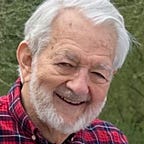Men for All Seasons: Two Profiles in Courage
~Tom Mahon
My alma mater, the College of St. Thomas in St. Paul, Minnesota, was a small, Catholic, liberal arts school in the Upper Midwest when I graduated in June 1967. In the 50+ years since then, it has become the largest private university in Minnesota, the University of St Thomas.
When I attended, St Thomas was known as the poor man’s Notre Dame, though both schools enjoyed the patronage of an oil baron, I.A. O’Shaughnessy whose name still adorns many buildings at both schools. (What St. Thomas didn’t have was a winning football coach like Knute Rockne to get the school national attention.)
Idealism was rampant in the US in the mid-1960s. Before he was elected president, John Kennedy (and Ted Sorensen) had written a Pulitzer Prize-winning book, Profiles in Courage, about eight U.S. senators who took stands of conscience in their careers. At the same time, a very popular play on Broadway, A Man for All Seasons, told of Thomas More’s stand against King Henry VIII, on the matter of divorce. More was beheaded for his ‘treason,’ and today is considered the Patron Saint of Lawyers.
I bring this up, reviewing our ravaged political landscape now, thinking of two men associated with my alma mater who became profiles of courage themselves about the time I graduated.
Senator Eugene McCarthy (no relation to Wisconsin’s Senator Joseph McCarthy) taught sociology and economics at St. Thomas College in the late 1940s. Soon after, he entered politics and by 1958 was a U.S. Senator from Minn. He was a rising star in the Democratic party — brilliant, articulate, witty, charismatic, and a man of integrity. If he had waited in line, he might eventually be the party nominee for president.
But in the fall of 1967, he risked it all to run against a sitting president from his own party, Lyndon Johnson, on Johnson’s mishandling of the growing Vietnam War. They say if you make a run against the king, you better succeed the first time, because you will never have a second change. What followed got very complicated, but in short, it ended McCarthy’s political career, and led to Vice President Hubert Humphrey’s nomination to run as President in 1968, which he lost to Richard Nixon.
The President of St. Thomas College, Bishop James Shannon, became a Bishop in 1965, the youngest in America then. As such, he was a delegate to the last session of Vatican II, the attempt by the Roman Catholic Church to acknowledge the existence of the Modern World. He came back from that and gave a very somber address to the students in 1966, telling us, “Popes come and go. The Roman Curia remains.”
The optimism of a revitalized Church that started in 1960 under Pope John XXIII was already going away, replaced by the stiff necks of Curial Cardinals like Alfredo Ottaviani. In 1968, a very timid Pope Paul VI, under curial influence, issued an encyclical titled Humanae Vitae, condemning artificial means of birth control. That did it. That summer, Bishop Shannon resigned his title and resigned from the priesthood. And with the departure of this leading figure in the liberal faction of the American Catholic Church - who was certainly on his way to a Cardinal’s red hat himself — the floodgates opened. And clergy and laypeople alike began to make for the exits from the Church.
Senator McCarthy and Bishop Shannon were two Irish Catholics born five year apart, and who died within two years of each other. They risked their rapid rise in the State and in the Church, on stands of conscience. They were each men for all season, the likes of which are in such short supply today.
At the time this was going on in Minnesota (in 1967–68), I relocated to San Francisco. It was ‘the summer of love,’ and like everyone else there then, I was dazzled by what I saw, though I had a hard time at first accepting the mantra du jour: “If it feels good, do it.”
But I soon got with the program, as so many of us did. Now as I look at the wreckage all around us, and see what a cockamamie trade off that was, I have an even greater appreciation for the former Senator and the former Bishop.
They embodied a humanist tradition that had no problem seeing deeper truths beneath the surface appearance. Their kind are missed. I do hope we will see their likes again. Soon.
© 2020, Thomas Mahon
